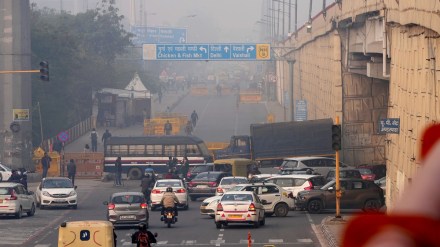The Haryana Police on Saturday issued a traffic advisory, urging commuters to limit travel on the main roads of the state to urgent situations on February 13. The warning comes in anticipation of potential traffic disruptions on major routes from Haryana to Punjab, due to farmers’ ‘Delhi chalo’ march.
Authorities have sealed the Punjab-Haryana borders in Ambala, Jind, and Fatehabad districts in preparation for the farmers’ proposed ‘Delhi Chalo’ march. The march, organised by more than 200 farmers’ unions, aims to exert pressure on the central government to address various demands.
Also Read: Barricades up at Delhi-UP borders, Section 144 imposed as farmers call for protest march on Feb 13
Ahead of the march, the government has taken measures such as suspending mobile internet services and bulk SMS in seven districts—Ambala, Kurukshetra, Kaithal, Jind, Hisar, Fatehabad, and Sirsa.
Haryana Director General of Police Shatrujeet Kapur, along with Inspector General of Police (Ambala Range) Siwas Kaviraj and Ambala Superintendent of Police Jashandeep Singh, visited the Shambhu border near Ambala to assess the arrangements in light of the upcoming farmers’ march.
Also Read:Noida farmers call off protest march to Parliament after assurance to look into demands
The Samyukta Kisan Morcha (Non-Political) and the Kisan Mazdoor Morcha have announced the ‘Delhi Chalo’ march on February 13, demanding the Centre to fulfill several demands, including enacting a law to guarantee a minimum support price (MSP) for crops.
Haryana police traffic advisory
The traffic advisory suggested alternative routes for commuters travelling from Chandigarh to Delhi and vice versa due to potential disruptions from the farmers’ ‘Delhi Chalo’ march.
Also Read: As farmers march towards Parliament, massive traffic snarls at Delhi-UP borders, security amped up
Commuters from Chandigarh to Delhi were advised to take routes via Derabassi, Barwala/Ramgarh, Saha, Shahbad, Kurukshetra, or through Panchkula, NH-344 Yamunanagar Indri/Pipli, Karnal. Similarly, those travelling from Delhi to Chandigarh were advised to consider routes via Karnal, Indri/Pipli, Yamunanagar, Panchkula, or Kurukshetra, Shahbad, Saha, Barwala, Ramgarh.
Due to the march, the Ghaggar flyover at the Shambhu border was closed, and barricades were placed on the road, causing traffic inconvenience. The Ghaggar river bed was also dug up to prevent farmers from reaching the highway through tractors.
Commuters heading towards Ambala through the Shambhu border faced significant traffic delays. The advisory urged the general public to travel to Punjab only in urgent circumstances.
Senior police officers were instructed to minimize inconvenience and ensure smooth law and order functioning. Temporary changes to traffic routes were prepared in affected districts like Ambala, Kurukshetra, Kaithal, Jind, Fatehabad, and Sirsa. However, traffic on other routes in the state was expected to remain unaffected, with the public urged to avoid unnecessary outings during this period.
Ambala Deputy Commissioner Shaleen assured tight security arrangements for February 13, including checkpoints at locations where farmers are expected. Concrete blocks, barbed wire, sandbags, barricades, and other items were stocked at the Shambhu border in Ambala to prevent protesters from marching towards the national capital. Similar preparations were underway in Jind and Fatehabad districts. The farmers planned to proceed to Delhi from the Ambala-Shambhu border, Khanauri-Jind, and the Dabwali border.
A three-member team of Union ministers engaged in a detailed discussion with farmer organisation leaders on Thursday. Despite assurances from the Central ministers regarding a second-round meeting, the farmer leaders reiterated their ‘Delhi Chalo’ march scheduled for February 13.
In addition to seeking a legal guarantee for Minimum Support Price (MSP), farmers are advocating for the implementation of the Swaminathan Commission’s recommendations, pensions for farmers and labourers, farm debt waiver, withdrawal of police cases, and justice for victims of the Lakhimpur Kheri violence.
